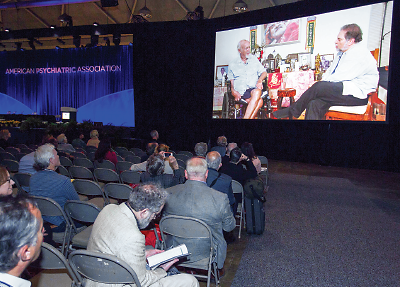At APA’s 2015 annual meeting in Toronto, APA President Paul Summergrad, M.D., presented a conversation with 1960s icon Ram Dass videotaped at the latter’s home in Hawaii. They spoke of Dass’s extended journey through Indian mysticism and spirituality.
“I don’t identify with the mind,” he told Summergrad. “I identify with the soul. The mind has the ego—who we think we are.”
Dass experienced a stroke 12 years ago, leaving him with some aphasia that slowed his speech slightly. The episode had its compensations, though.
“The stroke bestowed on me spiritual stuff,” said Dass. He gave up his MG sports car and playing the cello and turned inward. “My body is 83, but I am infinite because I am soul in this body.”
The stroke also confirmed his belief in the value of letting go of expectations for the future and thoughts of the past. It is more important to be fully engaged in the present, said Dass, who wrote the classic countercultural book Be Here Now.
Consciousness exists on three planes, he said. The first is the real world. The second is the level of the individual soul whose goal is to merge with God. The third plane is the universal soul, or “atma” in the Hindu tradition. “It’s like being on a beach and you dive in and there’s no longer separation.”
Dass holds a Ph.D. in psychology and once served on the faculty at Harvard. He felt brushed off by the psychiatrists with whom he worked at the university health service there. Summergrad recalled his own youthful exploration of Zen meditation and his brief experimentation with LSD. Dass suggested that he did a lot more than merely explore both.
The divergent paths of Summergrad and Dass might provide parallel insights into the therapeutic relationship, Summergrad noted.
“Love, compassion, peace, wisdom, joy—these are in everyone,” said Dass. “You can bring joy from suffering. The negative things in this world are the stepping stones on the spiritual path to God. But when people are suffering, it’s important not to make them feel alone. With companionship, maybe you can provide something they need.”
Both in the video and in comments afterward, Summergrad spoke of how his personal interests and the current trends in psychiatry spurred him to seek out Dass for the interview.
“With the rising research into mindfulness, I thought it would be good to include this conversation in the mix of things at the APA meeting,” Summergrad told the audience. The theme he had selected for the meeting was “Integrating Body and Mind, Heart and Soul.” ■

